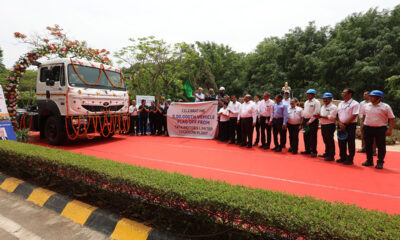Emirates Airlines has reaffirmed its commitment to boosting tourism in key destinations by forging strategic partnerships with tourism authorities in Seychelles, Sri Lanka, and Hong Kong.
In a move aimed at bolstering tourism to Seychelles, Emirates has renewed its cooperation with Tourism Seychelles. The airline’s Senior Vice President of Commercial for West Asia & Indian Ocean, Ahmed Khoory, signed a Memorandum of Understanding (MoU) with Sherin Francis, Principal Secretary of the Tourism Department in Seychelles. This agreement underscores Emirates’ dedication to supporting the tourism industry in Seychelles, a popular leisure destination in its network since 2005. As part of the partnership, Emirates will assist travel agents and tour operators in promoting Seychelles through special holiday packages, marketing support, and familiarization trips.
Similarly, Emirates has reiterated its commitment to promoting tourism in Sri Lanka by signing another MoU with the Sri Lanka Tourism Promotion Bureau. Ahmed Khoory signed the agreement with Chalaka Gajabahu, Chairman of the Sri Lanka Tourism Promotion Bureau, in the presence of Sri Lanka’s Minister of Sports and Youth Affairs, Honourable Harin Fernando. Emirates, which has been operating in Sri Lanka for 38 years, will continue to support the country’s tourism agenda by developing special packages and engaging with travel agents to showcase Sri Lanka’s attractions to its global customer base.
In addition to its endeavors in Seychelles and Sri Lanka, Emirates has entered into a new partnership with the Hong Kong Tourism Board (HKTB) to boost inbound tourism from the Middle East and Europe. Orhan Abbas, Emirates’ Senior Vice President of Commercial Operations Far East, and Becky IP, Deputy Executive Director of the HKTB, signed the MoU. Through joint initiatives such as familiarization trips and promotional campaigns, Emirates and HKTB aim to attract visitors to Hong Kong, renowned for its cosmopolitan attractions and dynamic cultural scene.
These strategic partnerships underscore Emirates’ commitment to supporting tourism and trade sectors across its network. By collaborating with tourism authorities in key destinations, Emirates seeks to stimulate tourism inflows, promote economic growth, and enhance the travel experience for its passengers.
Emirates Airlines’ strategic partnerships with tourism authorities in Seychelles, Sri Lanka, and Hong Kong mark significant milestones in the airline’s commitment to promoting tourism and fostering economic growth in key destinations across its network.
The renewed cooperation with Tourism Seychelles reflects Emirates’ long-standing presence and dedication to supporting tourism development in the picturesque island nation. With Seychelles being a popular leisure destination among travelers from around the world, Emirates’ commitment to promoting the country underscores its role as a key partner in driving tourism flows to the island. Through the signing of the MoU and the implementation of various promotional initiatives, Emirates aims to strengthen its collaboration with Seychelles’ tourism industry stakeholders, including travel agents and tour operators, to enhance the visibility and appeal of the destination to global travelers.
Similarly, Emirates’ continued commitment to Sri Lanka, exemplified by the signing of the MoU with the Sri Lanka Tourism Promotion Bureau, reinforces the airline’s enduring partnership with the South Asian country. Having operated in Sri Lanka for nearly four decades, Emirates has played a pivotal role in connecting the island nation with the rest of the world and facilitating tourism and trade exchanges. By developing special packages and engaging with travel agents, Emirates seeks to leverage its extensive global network to promote Sri Lanka’s diverse attractions, including its rich cultural heritage, pristine beaches, and lush landscapes, to a broader audience of travelers.
In the case of Hong Kong, Emirates’ new partnership with the Hong Kong Tourism Board (HKTB) underscores the airline’s commitment to supporting the city’s recovery and revitalization efforts in the wake of the COVID-19 pandemic. With Hong Kong being a vibrant cosmopolitan hub renowned for its dynamic cultural scene, culinary delights, and iconic landmarks, Emirates aims to introduce travelers from key markets in the Middle East and Europe to the city’s unique offerings. Through joint initiatives such as familiarization trips and targeted advertising campaigns, Emirates and HKTB seek to enhance Hong Kong’s appeal as a premier tourist destination and drive tourism growth in the region.
Emirates’ strategic partnerships with tourism authorities underscore the airline’s role as a key enabler of tourism and economic development in the destinations it serves. By leveraging its global network, brand recognition, and operational expertise, Emirates aims to support the recovery and growth of tourism sectors worldwide, contributing to job creation, income generation, and sustainable development.
As the aviation industry continues to navigate the challenges posed by the pandemic, Emirates remains committed to fostering partnerships and collaborations that promote resilience, innovation, and inclusivity in the tourism sector.
Overall, Emirates Airlines’ reaffirmed commitment to boosting tourism in Seychelles, Sri Lanka, and Hong Kong reflects its unwavering dedication to supporting the recovery and revitalization of tourism sectors worldwide. Through strategic partnerships with tourism authorities and industry stakeholders, Emirates aims to stimulate tourism inflows, enhance destination visibility, and create memorable travel experiences for its passengers. As the world gradually emerges from the pandemic, Emirates remains steadfast in its mission to connect people, cultures, and economies, driving tourism growth and fostering prosperity in the destinations it serves. Emirates Airlines’ reaffirmed commitment to boosting tourism in Seychelles, Sri Lanka, and Hong Kong reflects its unwavering dedication to supporting the recovery and revitalization of tourism sectors worldwide. Through strategic partnerships with tourism authorities and industry stakeholders, Emirates aims to stimulate tourism inflows, enhance destination visibility, and create memorable travel experiences for its passengers. As the world gradually emerges from the pandemic, Emirates remains steadfast in its mission to connect people, cultures, and economies, driving tourism growth, fostering prosperity, and promoting global connectivity in the destinations it serves.


 Opinion3 years ago
Opinion3 years ago
 Entertainment8 years ago
Entertainment8 years ago
 Entertainment8 years ago
Entertainment8 years ago
 Fashion8 years ago
Fashion8 years ago
 Opinion4 years ago
Opinion4 years ago
 Entertainment8 years ago
Entertainment8 years ago
 Politics8 years ago
Politics8 years ago
 Entertainment8 years ago
Entertainment8 years ago

















